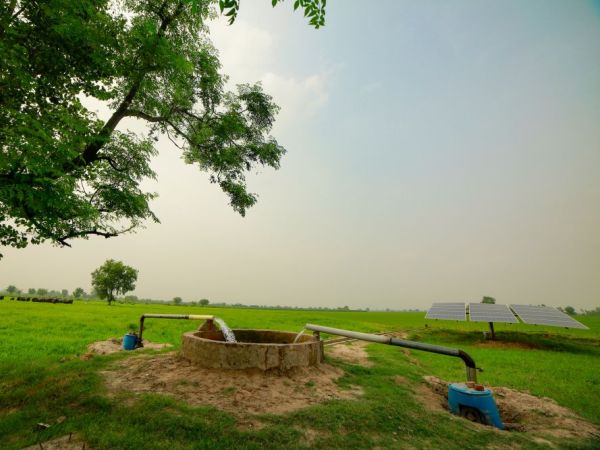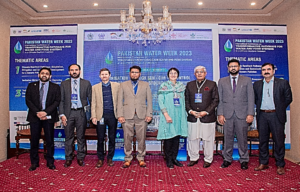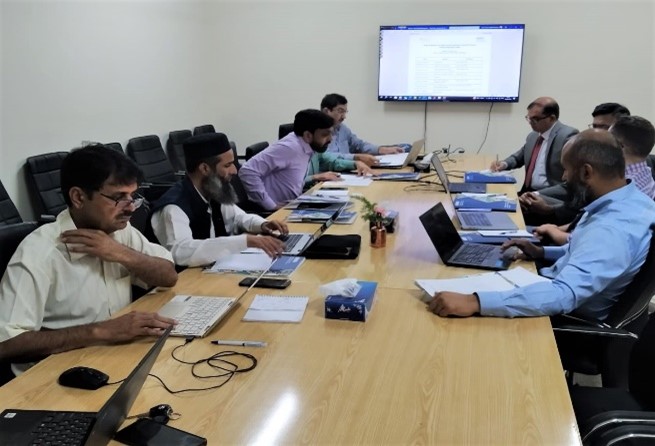
Pakistan does not have a specific solar irrigation policy. In 2015, the federal government of Pakistan announced a scheme for subsidizing small farmers (> 12.5 acres of land) for buying solar irrigation pumps. The government has set a target of 30,000 SIPs installed on a budget of USD 93.2 million over 5 years. In 2016, the provincial government of Punjab launched a similar scheme in collaboration with Asian Development Bank that provided an 80% subsidy for installing solar irrigation pumps.
There are a number of ongoing development investments in solar technology for groundwater pumping in agriculture. The largest investment is the Punjab Irrigated Agriculture Productivity Improvement Program Project, which seeks to stimulate the use of drip irrigation technology through capital cost subsidies. The World Bank is heading another initiative in the Sindh to introduce drip irrigation systems coupled with solar technology. A number of pilots have also been undertaken by the Pakistan Council of Research in Water Resources (PCRWR) and the Pakistan Agricultural Research Council (PARC) – our partners in the SoLAR project.
Currently, groundwater utilization in Pakistan meets 60% (or 68 billion m3) of the total irrigation water requirements of the country. Across the country, there are ~1.3 million tube wells of which 83% are diesel-powered; most of these tube wells are installed at shallow depths, between 12-18 meters. The average farm size where diesel-powered tube wells are installed is less than 5 ha and these constitute approximately 5% of the total farms. Solar-powered irrigation systems provide a promising alternative to diesel-powered tube wells but adopting this technology at scale has several challenges.
| Updates |
Research on Solar Pumping: A key focus at the Pakistan Water Week

(L-R): Dr. Adeel Waqas (NUST University), Hafiz Qaiser (OFWM, Punjab), Mr. Francois Onimus (World Bank), Mr. Muhammad Nasir Jamal (CEO, Rabail Technologies) Dr. Claudia Ringler (IFPRI), Eng. Tahir Anwar (Ex DG FWMC), Dr. Azeem Ali Shah (IWMI), Eng. Kifayat Zaman (DG, FWMC)
IWMI-Pakistan hosted the international conference during the 3rd Pakistan Water Week 2023 from 4th to 6th December 2023 in Serena Hotel, Islamabad. This year’s Water Week served as a pivotal platform for the dissemination of knowledge and the stimulation of discourse aimed at addressing the challenges posed by climate change, water scarcity and food insecurity in Pakistan. It played a crucial role in enhancing public consciousness and fostering deliberations paving the way for viable solutions to these pressing issues.
The conference also facilitated the exchange of international scientific methodologies and guidance to allocate resources towards development expenditures and policy formulation through empirical research rather than mere conjecture.
A National Forum entitled Irrigation through SUN – Can we control the heat to sustain our groundwater aquifers? was exclusively held as part of the SoLAR initiative that took place within the Pakistan Water Week 2023 on 6th December 2023 under the Thematic Area: Technologies and Innovations: Responding to the Challenges of Water and Food Security. The session aimed at creating a general understanding of solar irrigation practices in Pakistan, with a special focus on IWMI’s research on solar pumping, alongside a goal of assessing a viable and sustainable trajectory for the agricultural sector with regards to SIPs. The forum also featured a detailed presentation of the Prime Minister Solarization scheme of tube wells in Pakistan from the Director General of the Federal Water Management Cell of the Ministry of National Food Security and Research.
Fourth Pakistan C-PMC Meeting held at CEWRI
 The 4th Country Project Management Committee (C-PMC) Meeting for the SoLAR Project took place at the Climate Energy & Water Research Institute (CEWRI) in the National Agricultural Research Centre (NARC), Islamabad on June 8, 2023. The participants at the meeting included Mohsin Hafeez, Country Representative International Water Management Institute (IWMI), Azeem Shah (IWMI), M. Zain (IWMI), Adeel Waqas and Kashif Imran from the National University of Science and Technology (NUST), Andrew Bell (Boston University), Bashir Ahmad and Khalid Jamil from Pakistan Agricultural Research Council (PARC), M. Ashraf from Khwaja Fareed University of Engineering & Information Technology (KFUEIT) and Muhammad Muzzamil of Buraq Integrated Solutions. At the meeting, there were presentations on each component of the SoLAR project followed by intensive discussion on the results. Azeem Shah (IWMI Pakistan) gave an overview of the project activities while Khalid Jamil (PARC) presented on the innovation fund trials, experimentation and training M. Ashraf (KFUEIT) presented on the precision surface irrigation trials and capacity building training. Andrew Bell presented the results of choice experiments to determine the farmer’s behavior while Muhammad Muzzammil of Buraq Integrated Solutions presented on in-situ instrumentation. Before closing the meeting, future activities of the project were discussed.
The 4th Country Project Management Committee (C-PMC) Meeting for the SoLAR Project took place at the Climate Energy & Water Research Institute (CEWRI) in the National Agricultural Research Centre (NARC), Islamabad on June 8, 2023. The participants at the meeting included Mohsin Hafeez, Country Representative International Water Management Institute (IWMI), Azeem Shah (IWMI), M. Zain (IWMI), Adeel Waqas and Kashif Imran from the National University of Science and Technology (NUST), Andrew Bell (Boston University), Bashir Ahmad and Khalid Jamil from Pakistan Agricultural Research Council (PARC), M. Ashraf from Khwaja Fareed University of Engineering & Information Technology (KFUEIT) and Muhammad Muzzamil of Buraq Integrated Solutions. At the meeting, there were presentations on each component of the SoLAR project followed by intensive discussion on the results. Azeem Shah (IWMI Pakistan) gave an overview of the project activities while Khalid Jamil (PARC) presented on the innovation fund trials, experimentation and training M. Ashraf (KFUEIT) presented on the precision surface irrigation trials and capacity building training. Andrew Bell presented the results of choice experiments to determine the farmer’s behavior while Muhammad Muzzammil of Buraq Integrated Solutions presented on in-situ instrumentation. Before closing the meeting, future activities of the project were discussed.
Learnings from SDC SoLAR projects were shared with the Ministry of National Food Security and Research to design the agri-solarization scheme launched by the Government of Pakistan.
Pakistan Prime Minister Shahbaz Sharif announced the approval of a 10,000 MW solar energy project aimed at reducing import bills that come from importing costly diesel and furnace oil. The scheme has included solarization of 100,000 tube wells across Pakistan with a cost of PKR 377. The federal government, respective provincial governments and the farmers will equally share the costs of these tube wells.
Identifying Farmers for In-situ Instrumentation in Punjab, Pakistan
From 7th March to 11th March 2022, members from SoLAR – Pakistan, IWMI, visited 12 sites in three districts of Punjab – Chakwal, Jhang and Rahim Yar Khan – to identify 12 sites to be monitored with in-situ instrumentation. These would include 6 diesel and 6 SIPs..Read more..
IWMI signs MoU with Pakistan Agricultural Research Council of Ministry of National Food Security and Research, Government of Pakistan
Expanding on International Water Management Institute’s (IWMI) mission to provide sustainable and climate friendly water solutions..Read more..
IWMI signs MoU with Federal Water Management Cell of Ministry of National Food Security and Research, Government of Pakistan
Expanding on International Water Management Institute’s (IWMI) mission to provide sustainable and climate friendly water solutions..Read more..
IWMI Pakistan hosts online training on WinSRFR Model
IWMI Pakistan organised a two-day training on the WinSRFR model from 22-23 December 2020 on designing a farmer field using..Read more..
A telephonic survey in Pakistan to understand the water use pattern of SIP farmers
A telephonic survey with SIP farmers was conducted between November and December 2020 to assess water use patterns among SIP farmers in Punjab..Read more..
Pakistan holds 2nd Country Project Management Committee (C-PMC) meeting: where does access to solar irrigation stand?
Stakeholders from IWMI, Federal Water Management Cell (FWMC), Pakistan Agricultural Research Council (PARC), On Farm Water..
Meeting and field visit at Pakistan Agricultural Research Council, Islamabad.
A detailed meeting at the PARC office in Islamabad was held between the Director of PARC and the Country Lead of the SoLAR project..
Field Visit of Precision Surface Irrigation Site in Rahim Yar Khan and inspection of the field trials.
IWMI, under the SDC, funded SoLAR project, has partnered with Khawaja Fareed University of Engineering and Information Technology (KFUEIT)..
Training session for Farmers and Technicians on Operation and Maintenance of Solar Pumping Unit and Precision Surface Irrigation.
A training session was organized for farmers and technicians on the afternoon of 31 March 2021 at the Khwaja Fareed University of Engineering..
Rapid Enumeration of SIPs and Diesel Pump Farmers in Pakistan.
A rapid enumeration survey was conducted with SIP farmers between May-June 2021 to collect data for a group of farmers across three districts of Punjab in Pakistan.
Training on Google Earth Engine Applications at KFUEIT.
Professionals and young engineers were trained on ‘Google Earth Engine Applications in Water Management and Role of Telemetry on Water Accounting’ on 24 November 2021.
IWMI Pakistan Conducts Behavioral Study in Chakwal and Jhang.
Six hundred farmers are being surveyed in three districts of Punjab, viz., Chakwal, Jhang and Rahim Yar Khan, under the SDC-SoLAR project in Pakistan.
Contact information
Dr. Azeem Ali Shah (Country Lead- Pakistan), Senior Regional Researcher: Governance of Water Institutions, IWMI-Pakistan
email: a.shah@cgiar.org
